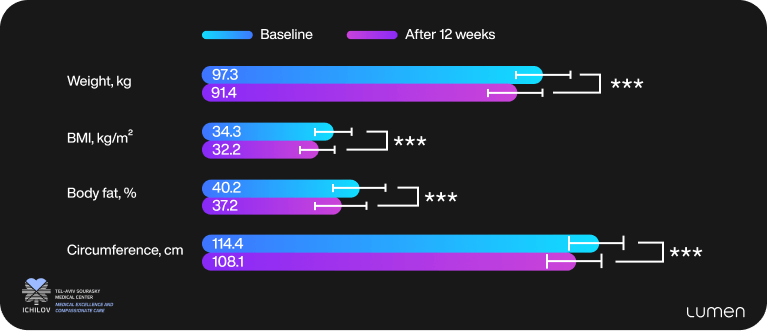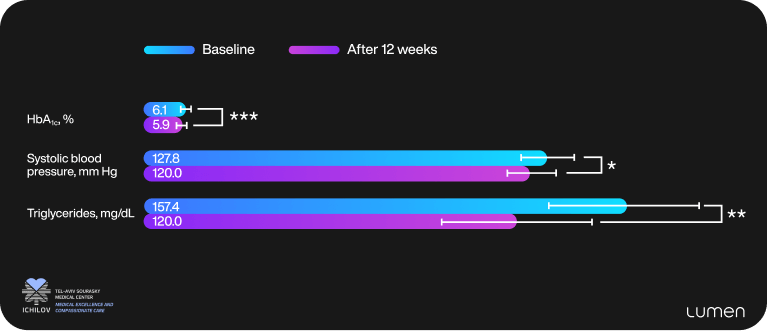The Ultimate Guide on How to Eat for Your Metabolism


Are you confident that the food choices you're making are healthy for you? Think again. Every day, millions of consumers make food choices that can have a profound impact on their health and well-being. Yet despite a growing awareness of the importance of good nutrition, many of us continue to make poor choices that can lead to chronic health conditions, from diabetes to heart disease, that compromise our metabolic health.
According to Pew Research Center (1), 54% of Americans are indeed paying more attention to healthy eating habits; however, in the same study, it was found that 54% are also eating less healthily. To support that, Statista found that 59% are not following nutritional rules.
With so many food options available, it's easy for consumers to fall into the trap of eating unhealthy foods that ultimately harm their bodies. But, did you know that changing your nutrition habits is actually much easier than you might think?
In honor of Nutrition Month, our Lumen nutritionists, scientists, and research team have teamed up to help you take back control of your health. By learning how your body's metabolism works, you can start making the right nutritional decisions and enjoy the health benefits!
By understanding the basics of metabolism and nutrition, we can already make smarter food and lifestyle choices. Our metabolism is the engine responsible for the process of converting the food we eat into energy that our bodies can use. It involves a complex set of chemical reactions that break down the nutrients in our food, such as carbohydrates, proteins, and fats and turn them into usable energy for our cells.
Brea Lofton, a registered dietitian at Lumen explains that “to effectively shift to and from carb burn and fat burn, we need to eat and live in a way that makes our metabolism flexible.”
Our metabolic health is linked to the nutritional decisions we make and eating a balanced diet is important for becoming metabolically flexible. With the right fuel, our metabolism functions efficiently, making it easier for us to shift to fat burn. The good news is that with the right tools, you can achieve this state of metabolic flexibility by forming healthy habits.
"In order to really personalize your weight loss plan, you need first to assess your current metabolic health, taking into consideration your current nutrition habits, including your smoking and alcohol consumption and your regular eating times." shares Mia Johanna Dige, Lumen’s personal trainer and coach.
What happens to our bodies when we eat? From a physiological point of view, a series of complex processes occur in our bodies to break down food and extract the nutrients that our bodies need. When we make nutritional decisions, we are essentially deciding what kind of fuel to provide our metabolism with.
If we think about our metabolism as an engine, it can easily be damaged with the wrong fuel (think diesel in a Bronco - that’s a huge no-no). In this case that 'diesel' is nutrient-poor food that is high in sugars. When that happens, a vicious cycle begins as our glucose rises quickly, and also drops quickly. This is when we feel the urge to reach for more carbs, in turn, leading to carb snacking. Our blood sugar levels shoot up and take a huge toll on our bodies. Our engine becomes overwhelmed and stores carbs as fat - which can lead to weight gain and a less efficient metabolism. Worse... over time, this can lead to the "ugly" - insulin resistance - a precursor to type 2 diabetes.
Following a personalized nutritional plan of eating real, whole foods made up of ample protein, healthy fats, and healthy carbs will promote stable blood glucose levels. This leads to less carb snacking and allows the body to tap the body's fat reserves for fuel. Eating carbs in moderation promotes the utilization of carbs for fuel, instead of storing carbs as fat. Your body will be able to shift to fat burn by the time you wake up, and over time, your metabolic flexibility will improve and may improve your insulin sensitivity. This positive cycle will make it easier for you to reach your health goals more sustainably.
When you have enough motivation to start new healthy habits and stick to them, you will see sustainable differences over time. Assessing your current metabolic health sets the stage for what your body needs to get healthier. In a recent clinical trial (3), participants who used Lumen for 12 weeks, achieved 6% average weight loss (on average, 13 pounds lost) and significant reductions in body fat, and waist circumference.

*** indicates statistical significance
Let’s set the groundwork with some practical strategies and tips for using nutrition to support your metabolic health and live a healthier, happier life.
The transition to healthy eating habits does not have to be a challenging hurdle. With the right tools, lifestyle habits, and nutrition plan, you can reach metabolic health sooner than you think.
One of the best things you can do is eat at the right time. This is not always an easy task considering how on-the-go and messy life can be - leaving food as an afterthought or a junk drawer to save the day. You’re not alone. This eating style can prevent the body from entering a fat-burning zone while asleep.
“Many people underestimate how important the time that you eat has on your health,” Marine Melamed, registered dietitian at Lumen, shares that “nourishing your body at the right times will affect your workouts, sleep, stress levels, and overall well-being.”
With so many distractions, we tend to undervalue how important mastering your eating times is to maintain a sustainable lifestyle. Learning how your body responds to meal timing, snacks, and quality of nutrition can give you a vivid picture of your metabolic health.
According to a Physiology & Behavior (5) study, people consuming a high-calorie breakfast lost significantly more weight than those who consumed a high-calorie dinner. Finishing your last meal early (3 hours before sleep) will positively impact your metabolism and promote fat burn. Eating at the right times, fasting, and finishing your meals earlier in the day can have a bigger impact on your physiology than you might've realized.
Top Tips from our Lumen Nutritionists:
At Lumen, our users are given a personalized macronutrient diet, instead of counting calories. A macro diet is a way of eating that focuses on the balance of your food, which includes carbohydrates, protein, and fat. This approach helps you build muscle, maintain a healthy weight, and avoid cravings/binges between meals. Eating these foods in the right quantities and at the right time will help you achieve sustainable weight loss and reach optimal metabolic flexibility.
Macros are short for macronutrients. These are the three main types of food: Carbohydrates (carbs), Protein, and Fat. Here are some examples of those foods.
To get started, you'll need to eat a balanced diet. Your body uses these macronutrients for energy and other functions. A healthy diet is approximately comprised of 40% carbs, 30% fat, and 30% protein - this can change daily depending on your activity and lifestyle. If you have trouble balancing your macros, try using the Lumen app which can automatically calculate a personalized amount based on your metabolism.
Your printable cheatsheet of healthy foods for your grocery list
To make shopping a breeze for you, download this Lumen cheat sheet PDF printable of healthy foods for your grocery list!
When you’re shopping or eating out, choose real, whole, nutrient-dense foods, like foods that have vitamins that positively impact your body. Examples of these include lean proteins, healthy fats, fruits, vegetables, whole grains, and healthy carbs in moderation. Like we learned above, opting for these ingredients will promote stable glucose levels. With stable blood glucose, there are no sharp drops of blood sugar, and this helps avoid carb snacking. Less carb snacking allows the body to tap the body’s fat reserves for fuel. Eating carbs in moderation promotes the utilization of carbs for fuel - not the storage of carbs as fat. You'll be able to shift to fat burn overnight, and over time, metabolic flexibility improves, and insulin sensitivity improves. In turn, your health goals can then be reached sustainably!
This means more fruits and vegetables instead of starches like bread or rice. These foods help you snack less and also avoid sharp drops in blood sugar.
Whole, natural foods are the best way to fuel your metabolism. Avoid processed foods whenever possible and instead choose whole, unprocessed ingredients. These include: fresh fruits and vegetables, beans, legumes, and nuts, plus, whole grains like brown rice and oats.
Eat more fat, especially healthy fats like avocado and olive oil. Avoid trans-fats like those found in "addictive" food such as fried foods. Fats help you absorb vitamins and nutrients from other foods. They also keep you feeling full longer, which means less snacking. They can even help you lose weight if you eat the right fats –like those found in avocados, olive oil, nuts (especially walnuts), and fish like salmon or sardines that are rich in omega-3 fatty acids.
Top Tips from Lumen’s Nutritionists on what to eat:
Making healthy choices when it comes to nutrition is more than just counting calories or avoiding certain foods. Understanding nutrition's role in overall health and well-being helps us make informed eating choices and promotes metabolic health.
Your printable 7-day low-carb menu with recipes
Download this 7-day low-carb menu with easy-to-make recipes and food ideas for breakfast, lunch, and dinner.
Sustainable weight loss and healthy eating can help in preempting and managing conditions like diabetes, and health complications such as high blood pressure, high cholesterol, and high glucose levels.
In a recent clinical trial (4), participants who used Lumen for 12 weeks, blood pressure, HbA1c, and blood lipids. By following the Lumen nutrition plan, participants showed improvements in the three metabolic parameters, especially in triglycerides (fat in the blood).

It might take time to get the hang of new habits, but eating healthy food at the right times, in the right portions - and sticking to them - can do wonders for your body and health.
"Focus on your mindset, and it will make it easier to shift your metabolism," advises our personal trainer and coach Mia Johanna Dige.
We have all heard that your mind is a powerful tool. Do not underestimate it when you are creating these new habits of eating! According to an article on Healthline (6), it takes about 66 days to create a new habit on average. That is more than two months of consistency, dedication, and intention to form a new way of eating and thoughts surrounding food.
One of the main mindset shifts to adopt is realizing this is not just a "diet" but a lifestyle. Diets typically only last for a certain period of time and yield minor results, only to gain the weight back once the diet is over. A lifestyle is a way of living, and recognizing this isn't a change that should torture you or deprive you of the good parts of life, but rather focus more on balancing whole, healthy foods into your everyday routine.
How do you know if you have made a lasting change? You track your progress! It can become defeating if you do not notice any changes in the mirror, and oftentimes, we do not recognize those changes since we see our physical bodies daily. “A metabolically flexible person wakes up more often burning fat and shifts easily to burning carbs after eating without storing it as body fat,” says Mia Johanna Dige, Lumen’s personal trainer and metabolic coach.
One way to keep the motivation going is to track real-time results by logging food, macros, weight, and inches! One of the best ways to track weight loss is to use a device that motivates you and helps you keep on track! Guidance and encouragement also go a long way when making a radical change to our lifestyle habits, especially when daily objectives drift and you need to get back on track. Consider joining online forums with people that share the same goals as yours.
You won’t always be able to stick to your plan perfectly and although "cheat meals" have a negative connotation to them, we like to encourage flexible eating. This simply means that once you have your macros dialed in, there is some wiggle room every now and then for that craving or chocolate (dark chocolate is a great healthy alternative). It helps immensely if you have been tracking with metrics and know where you can slide in those little treats at the most optimum times for your body! Balance is key, and anyway, who said you couldn’t make vegetables cool again?!
Lumen's approach includes finding a personalized solution for your specific body type. We focus on nutrition that can lead to stabilizing blood glucose, increases steady energy, and improves or dissolves the desire for binge eating or snacking altogether.
But, like any radical change, there are a few “make or break” principles to be aware of - like the importance of nutrition, and incorporating movement, sleep, and stress management into your life. Incorporating all four of these principles into your life can help you become more metabolically flexible, making it easier to achieve your health goals.
We hope this article has helped you better understand how to eat for your metabolism. It's not as simple as going on a diet or cutting out certain foods, but rather an awareness of what your body needs to function at its best. As a reminder, focus on your meal timing, eating whole, eating the correct macronutrients for your body, consuming whole, colorful foods, and avoiding sugar at all costs!
Don't forget that there are plenty of resources online that can guide you along the way: check out our blog post about seven ways how to boost metabolism here!
Funk, C. (2020, May 30). 1. public views about Americans' eating habits. Pew Research Center Science & Society. https://www.pewresearch.org/science/2016/12/01/public-views-about-americans-eating-habits/
Recent studies link energy regulation to the circadian clock at the behavioral, Garaulet, M., Froy, O., Itokawa, (2014, January 24). Timing of food intake and obesity: A novel association. Physiology & Behavior. https://www.sciencedirect.com/science/article/abs/pii/S0031938414000031
Pietrangelo, A. (2021, October 19). What you need to know about type 2 diabetes. Healthline. https://www.healthline.com/health/type-2-diabetes

Abigail Markman is a Nutritionist, with a MS in Nutritional Sciences,